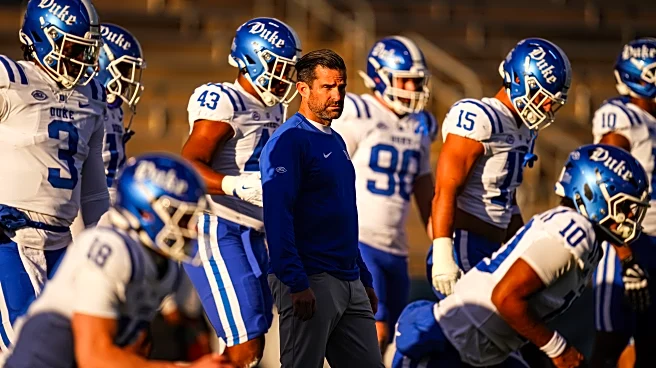UConn is no longer part of the American Conference, and hasn’t been since the fall of 2019, but the Huskies logged one of the more significant non-conference victories for the league Saturday evening in East
Hartford.
UConn outlasted Duke 37-34 in a back-and-forth thriller which featured nine lead changes, with a Joe Fagnano to Skyler Bell connection at the 2-minute timeout serving as the ninth and final lead change of the contest. It was a heartbreaking defeat for Manny Diaz and the Blue Devils, but the silver lining for Duke is — that result has no bearing on its chance to win its first ACC title since 1989.
However, the loss is significant in another manner. The ACC could now be a 0-bid league when it comes to the College Football Playoff.
First, let’s go over the College Football Playoff format. There are five automatic bids given to the five highest-ranked champions — regardless of conference — and seven at-large bids. The current College Football Playoff committee rankings almost ensure the three highest-ranked champions will hail from the Big Ten, SEC, and Big 12. But after that, it gets a bit more complicated.
The initial rankings revealed on Nov. 4 slotted Virginia as the highest-ranked ACC team at No. 14. Louisville followed at No. 15, then Georgia Tech at No. 17, Miami (FL) at No. 18, and Pittsburgh rounded out the ACC representatives at No. 24. Virginia and Louisville both suffered home upsets on Saturday, with the Cavaliers falling 16-9 to Wake Forest and the Cardinals dropping a 29-26 overtime thriller to California. The ACC’s two highest-ranked teams will undoubtedly drop, so without any teams in the top 12, the league won’t have any teams in consideration for at-large spots — at least for the time being.
(Note: Miami (FL) would be a potential at-large bid at 10-2 with signature wins over Notre Dame and South Florida, but the Hurricanes’ losses to Louisville and SMU significantly derailed their shot at qualifying for the ACC Championship Game. Georgia Tech could also land an at-large spot as well with an 11-1 regular season and an ACC title game loss, similar to how SMU punched its ticket in 2024.)
So why is Duke’s loss to UConn so important? Because Duke, which is currently 5-4, could realistically win the ACC and controls its own destiny to do so. In fact, it was the Vegas favorite to win the conference crown prior to Week 11. The Blue Devils finished 1-3 in non-conference play with losses to Illinois, Tulane, and UConn, but they’ve handled their ACC peers quite well, defeating NC State, Syracuse, Cal, and Clemson with a lone slip-up to Georgia Tech. Looming on the schedule is a critical home matchup vs. Virginia this Saturday, a road matchup at North Carolina on Nov. 22, and a home finale vs. Wake Forest on Nov. 29.
Clearing that schedule positions Duke in Charlotte for the ACC Championship Game, and if the Blue Devils win, would they receive a playoff bid at 9-4?
Many of the ACC contenders are riddled with non-conference losses, making this championship race particularly intriguing. SMU (which has one ACC loss) dropped games to Baylor and TCU. Virginia (which also has one ACC loss) dropped a technical “non-conference” matchup to NC State. Pittsburgh (yet another team with one ACC loss) was tripped up by West Virginia. Heading into CFP selection day, SMU’s best possible finish is 10-3, while Virginia and Pitt can fare 11-2 by winning the ACC Championship Game. At the end of day, those records may be enough to clinch a CFP bid as one of the five-highest ranked conference champions — finishing ahead of an American Conference champion and/or Sun Belt frontrunner James Madison.
But what if Duke wins? That opens up a scenario where both the American champion and James Madison can qualify for the playoff. The American is in excellent position after a quality non-conference résumé where the league defeated one ACC (Tulane over Duke), one Big Ten, two Big 12, and two SEC teams, with other notable non-conference victories involving shellackings of Boise State and Washington State, and even a win over 7-3 UConn. Meanwhile, James Madison is 8-1 with a lone 28-14 Week 2 loss to Louisville — where the game was tied entering the fourth quarter before a late Cardinals’ run. Even though the Sun Belt lacks the non-conference performance of the American, a 12-1 JMU record with several dominant victories and one close Week 2 loss to Louisville could do the trick.
There has been heated debate between fanbases of American Conference contenders and the James Madison faithful regarding the College Football Playoff race, but Duke is the ticket for the parties to settle their differences and both qualify. The American can produce five different champions with two total losses or fewer — South Florida, North Texas, Tulane, Memphis, and Navy, and many of these teams could be slotted above 9-4 Duke. For the American, the disaster scenario of not attaining a bid likely involves 3-loss East Carolina winning the conference, as the Pirates dropped non-conference clashes to NC State and BYU early in the year. Perhaps, the 10-3 Pirates would be skipped in favor of 9-4 Duke and a 12-1 James Madison.
The MAC is essentially eliminated with 6-3 Ohio standing as its best team. The Mountain West all but devoured its chances the past two weeks, considering Fresno State dominated Boise State 30-7 and Hawaii handled San Diego State 38-6. Conference USA has an extremely minuscule shot of getting a bid even if Kennesaw State finishes 11-2, due to the league’s non-conference struggles. Thus, it’s the ACC, American, and James Madison playing musical chairs for the final two automatic bids in the College Football Playoff.
If you’re a fan of an American contender or the JMU Dukes, you are also a fan of the Duke Blue Devils for the rest of the season. None of the three are currently ranked by the CFP committee, providing a level of uncertainty in their hierarchy, but the 9-4 Duke scenario paves a realistic pathway to a 0-bid ACC, a 1-bid American, and 1-bid Sun Belt.









